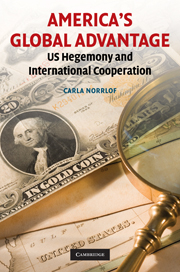Book contents
- Frontmatter
- Contents
- List of figures
- List of tables
- Preface
- Acknowledgments
- 1 Introduction
- 2 The forms and consequences of hegemonic leadership
- 3 Cooperation under hegemony
- 4 International trade cooperation
- 5 Interactive effects between monetary and commercial power
- 6 The security card
- 7 Credible threats and regional competition
- 8 Conclusion
- References
- Index
5 - Interactive effects between monetary and commercial power
Published online by Cambridge University Press: 19 May 2010
- Frontmatter
- Contents
- List of figures
- List of tables
- Preface
- Acknowledgments
- 1 Introduction
- 2 The forms and consequences of hegemonic leadership
- 3 Cooperation under hegemony
- 4 International trade cooperation
- 5 Interactive effects between monetary and commercial power
- 6 The security card
- 7 Credible threats and regional competition
- 8 Conclusion
- References
- Index
Summary
The specific focus of this chapter is how monetary privilege interacts with commercial dominance and, in particular, how the United States’ special position in the monetary domain has produced commercial advantages, and how commercial power has enhanced monetary gains. While the extent of these gains varies over different periods, the political and economic benefits over the last quarter-century have, on the whole, been extraordinary and arguably greater than what any other state has been able to achieve.
Chapter 2 raised concerns about how to quantify benefits from international economic cooperation and suggested possible measures. In this chapter, I will show that the United States benefits disproportionately in the trade and monetary realm. Over the twenty-five year period under consideration, more goods have come to the United States than have been shipped out to foreign destinations. By implication, more capital has also flowed into the United States than out of the United States (see chapter 4). More significantly, aggregate yields on the smaller capital outflow (or, more precisely, stock of foreign assets) have been higher than on the larger capital inflow (i.e., stock of foreign liabilities). Due to its financial hegemony, the United States has also experienced significant capital and exchange rate gains on the value of its foreign assets and liabilities. Even when scaled to economic size, i.e., as a share of GDP, these gains are higher than the gains experienced by any other state. As I will also show, the United States is able to pursue and benefit from policies that would be disastrous for other countries, and so also gains politically in terms of policy autonomy.
- Type
- Chapter
- Information
- America's Global AdvantageUS Hegemony and International Cooperation, pp. 115 - 166Publisher: Cambridge University PressPrint publication year: 2010



